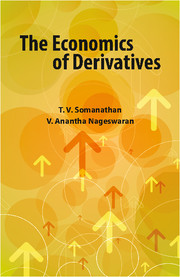Book contents
- Frontmatter
- Dedication
- Contents
- List of Tables, Figures and Boxes
- Foreword
- Preface
- Acknowledgements
- 1 Introduction
- 2 Definition and Typology
- 3 The Economic Functions of Derivatives Markets
- 4 Market Completion
- 5 Derivatives and Price Stabilization
- 6 Derivatives and Price Destabilization
- 7 The Effects of Derivatives on Prices of the Underlying: A Synthesis
- 8 Causes of the Rapid Growth in Derivatives Trading: A Historical Perspective
- 9 The Role of Derivatives in the Global Financial Crisis of 2008
- 10 Models and their Effects on Markets
- 11 Derivatives and Emerging Markets – Part I
- 12 Derivatives and Emerging Markets – Part II
- 13 Regulation of Derivatives
- 14 Derivatives and Development: A Critique
- 15 Regulatory Policy for Derivatives: A Pragmatic Approach
- Index
- About the Authors
13 - Regulation of Derivatives
Published online by Cambridge University Press: 05 May 2015
- Frontmatter
- Dedication
- Contents
- List of Tables, Figures and Boxes
- Foreword
- Preface
- Acknowledgements
- 1 Introduction
- 2 Definition and Typology
- 3 The Economic Functions of Derivatives Markets
- 4 Market Completion
- 5 Derivatives and Price Stabilization
- 6 Derivatives and Price Destabilization
- 7 The Effects of Derivatives on Prices of the Underlying: A Synthesis
- 8 Causes of the Rapid Growth in Derivatives Trading: A Historical Perspective
- 9 The Role of Derivatives in the Global Financial Crisis of 2008
- 10 Models and their Effects on Markets
- 11 Derivatives and Emerging Markets – Part I
- 12 Derivatives and Emerging Markets – Part II
- 13 Regulation of Derivatives
- 14 Derivatives and Development: A Critique
- 15 Regulatory Policy for Derivatives: A Pragmatic Approach
- Index
- About the Authors
Summary
… [A] man firing a rifle goes through the same motions whether he is aiming at a target on a rifle range, at a deer, or at a man across the street. And there apparently are some people who can shoot at a man with as little feeling as at a practice target. It is nevertheless profitable for society to distinguish among different uses of a rifle, and among different uses of risk-taking for monetary gain. Nor do we have any real difficulty in drawing these distinctions when we reject sophistry and apply common sense. We call a man an entrepreneur when he takes risks in a clearly useful type of business venture; a gambler when he takes risks of a nature that clearly serve no substantially useful economic purpose; and a speculator when he takes risks of another sort, that some people do not recognize as economically useful, though others regard them as highly useful.’
Holbrook WorkingDerivatives are (economic) tools and, like most tools, can be used as well as misused. In the most elementary sense, it is to prevent misuse – to prevent the use of the rifle to commit murder, in terms of Working's analogy – that a need arises for regulation.
Kahn, in his seminal work on the economics of regulation (largely in the context of public utilities) made the interesting point that ‘economics emerged in the eighteenth and nineteenth centuries as an attempt to explain and to justify a market system’. Therefore, to classical economists, regulation would clearly represent an exception to standard economic prescriptions. Kahn regarded regulation as, in essence, the ‘explicit replacement of competition with governmental orders’ as a means of ensuring ‘good performance’.
Overall, economic theory suggests that regulation is justified in three kinds of situations:
• to prevent serious distortions to competition and the abuse of monopoly power;
• to protect ordinary people in circumstances where information is difficult or costly to obtain and mistakes could seriously affect their welfare; and
• to compensate for externalities in situations where the social costs of market failure exceed the private costs after factoring in the costs of regulation.
- Type
- Chapter
- Information
- The Economics of Derivatives , pp. 179 - 214Publisher: Cambridge University PressPrint publication year: 2015



